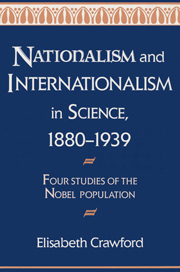Crossref Citations
This Book has been
cited by the following publications. This list is generated based on data provided by Crossref.
Olesko, Kathryn M.
1992.
Nobelists and Company:
Nationalism and Internationalism In Science, 1880-1939
. Four Studies of the Nobel Population. Elisabeth Crawford. Cambridge University Press, New York, 1992. xii, 157 pp., illus. $44.95.
.
Science,
Vol. 256,
Issue. 5059,
p.
1040.
Zuckerman, Harriet
1992.
The proliferation of prizes: Nobel complements and Nobel surrogates in the reward system of science.
Theoretical Medicine,
Vol. 13,
Issue. 2,
p.
217.
Palló, Gábor
1993.
Denationalizing Science.
Vol. 16,
Issue. ,
p.
209.
Tomášová, Silvia
1995.
A site in history: archaeology at Dolní Věstonice/Unterwisternitz.
Antiquity,
Vol. 69,
Issue. 263,
p.
301.
Elzinga, Aant
1995.
Physics, Philosophy, and the Scientific Community.
Vol. 163,
Issue. ,
p.
73.
Johnston, Sean F.
1996.
The Construction of Colorimetry by Committee.
Science in Context,
Vol. 9,
Issue. 4,
p.
387.
Melin, G.
1996.
The networking university.
Scientometrics,
Vol. 35,
Issue. 1,
p.
15.
Danneberg, Lutz
and
Schönert, Jörg
1996.
Wie international ist die Literaturwissenschaft?.
p.
7.
Ettre, L. S.
1996.
M. S. Tswett and the 1918 Nobel Prize in Chemistry.
Chromatographia,
Vol. 42,
Issue. 5-6,
p.
343.
Pyenson, Lewis
1996.
National Military Establishments and the Advancement of Science and Technology.
Vol. 180,
Issue. ,
p.
135.
Stump, David J.
1997.
Reconstructing the Unity of Mathematics circa 1900.
Perspectives on Science,
Vol. 5,
Issue. 3,
p.
383.
Danneberg, Lutz
2000.
Literaturwissenschaft und Wissenschaftsforschung.
p.
447.
Schofer, Evan
Ramirez, Francisco O.
and
Meyer, John W.
2000.
The Effects of Science on National Economic Development, 1970 TO 1990.
American Sociological Review,
Vol. 65,
Issue. 6,
p.
866.
Bensaude-Vincent, Bernadette
2001.
The Cambridge History of Science.
p.
174.
Hughes, Jeff
2001.
The Cambridge History of Science.
p.
350.
Pyenson, Lewis
2002.
Comparative History of Science.
History of Science,
Vol. 40,
Issue. 1,
p.
1.
Palmer, Allen W.
2002.
Negotiation and Resistance in Global Networks: The 1884 International Meridian Conference.
Mass Communication and Society,
Vol. 5,
Issue. 1,
p.
7.
Scheideler, Britta
2002.
The scientist as moral authority: Albert Einstein between elitism and democracy, 1914-1933.
Historical Studies in the Physical and Biological Sciences,
Vol. 32,
Issue. 2,
p.
319.
Pyenson, Lewis
2002.
An End to National Science: The Meaning and the Extension of Local Knowledgeh.
History of Science,
Vol. 40,
Issue. 3,
p.
251.
Nelson, Adam R.
2005.
The Emergence of the American University: An International Perspective.
History of Education Quarterly,
Vol. 45,
Issue. 3,
p.
427.



